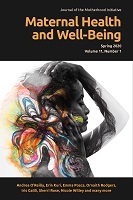Indigenous Motherhood and Indian Hospitals: Exploring the Impact on Generational Indigenous Mothering Using Feminist Ethnography as a Decolonial Practice
Abstract
Colonialism creates dehumanizing situations and alienates those who are colonized not only from themselves but also from their culture, language, and lands. Settler colonialism is defined as “settlement over Indigenous people and land” (Hart 25). Indigenous women in Canada were faced with colonizers who interfered with their matriarchy and egalitarian community values. Patriarchal views, which were at the core of colonialism, established controlling and eradication mechanisms in the form of “institutions such as Indian hospitals” (Brant 9). Both the physical and psychological abuse that was inflicted upon Indigenous women in Indian hospitals affected the mothering role and being mothered for both Indigenous women and children, which, ultimately, caused intergenerational trauma. Ethnographic storytelling and Indigenous feminism formulate a resistance as well as an activist stance towards colonial governments but also provide resources for a formal education for non-Indigenous people as part of a decolonial movement.Downloads
Published
How to Cite
Issue
Section
License
All intellectual property in relation to material included on this site belongs to the Motherhood Initiative for Research and Community Involvement (MIRCI). All material on this site is protected by Canadian and international copyright and other intellectual property laws. Users may not do anything which interferes with or breaches those laws or the intellectual property rights in the material. All materials on the Motherhood Initiative for Research and Community Involvement (MIRCI) are copyrighted and all rights are reserved. Any reproduction, modification, publication, transmission, transfer, sale, distribution, display or exploitation of the information, in any form or by any means, or its storage in a retrieval system, whether in whole or in part, without the express written permission of the Motherhood Initiative for Research and Community Involvement (MIRCI) is prohibited. Please contact us for permission to reproduce any of our materials. This site may include third party content which is subject to that third party's terms and conditions of use.


